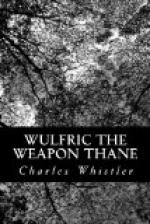Presently the tide turned against us, and Kenulf thought well that we should drop anchor and wait for its turning again. The men gladly laid in the oars, and the anchor rattled out and held. The ship swung to her cable, and then there seemed deep silence after the even roll and creak of the great sweeps in their rowlocks. The fog was very dense, and beyond our stem head I could see nothing.
Then to break the silence came to us, over no great stretch of water as it seemed, the sound of a creaking block, the fall of a yard on deck, and a voice raised in some sharp order. Then I thought I heard an anchor plunge, and there was silence. Very ghostly it seemed to hear these familiar sounds and to see naught, and it was the more so that we might by no means judge from which side of us, or fore or aft, the noises came, for fog will confuse all things, and save a driving snowstorm, I dread nothing more at sea.
Now the men began to speak in whispers, for the silence and weirdness of the fog quieted us all. And, moreover, when the fog lifted we had seen no ship, though there must be one close to us now, and we wondered.
But Kenulf came to me presently with a scared face, and waiting till the men had gone forward to find their food, he asked me if I heard the voice that spoke.
“Aye, surely,” I answered. “What of it?”
“Master,” he said, “the voice was a Danish voice, as I think. And I mind me of the fires we saw.”
“What then?” said I carelessly, though indeed I could see well what fear was in the old man’s mind. Yet I would have him put the thing into words, being ready to look the worst in the face at any time.
“The vikings, master,” he answered; “surely they were in Orwell mouth and saw us, and have given chase.”
“We should have seen them also,” I said.
“Not so, master, for the fog hung inland, and if a Dane lies in such a place he has ever men watching the sea—and they will sail two ship’s lengths to our one.”
“Supposing the ship is a viking, what should we do now?” I asked, for I knew of naught to do but bide where we were.
“Go back with tide and slip past them even now,” said Kenulf, though I think he knew that this was hopeless, for if we rowed, the sound of our oars would betray us, and if not we should be on a shoal before long, whence any escape would be impossible.
“Hark!” I said in another moment, and we listened.
There was little noise beyond the lapping of the swift tide against our sides. The men forward were silent, and I had thought that I heard the distant sound of voices and oars.
It came again in the stillness; a measured beat that one could not well mistake, as of a ship’s boat leisurely pulled.
Then one of our men began to sing in an undertone, and Kenulf smote his hands together in terror, for the sound would betray us, and he was going forward to stop the song.




